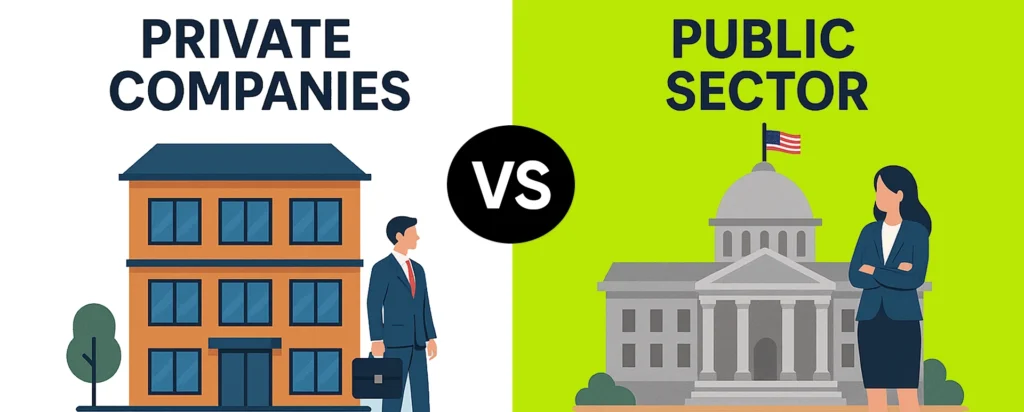The public sector is a part of the economy that is controlled and funded by the government. It provides essential services for citizens. Unlike private companies, it does not aim to earn a profit. Instead, it serves the interests of social welfare and national development.
The public sector encompasses various services, including healthcare, education, transportation, and security. These services are important because they improve the quality of life for people. Without this sector, organizations, many essential needs would remain unmet.
This blog explains what the public sector is and its main industries. It also shows how these organizations help and support the economy.
Public Sector Description: What It Includes

A simple public sector description shows that it is made up of organizations owned and managed by the government. These organizations provide goods and services that benefit the entire society.
This includes:
Government ministries and departments
State-owned companies
Local authorities
National agencies
So, these institutions work together to keep society and the economy balanced. Moreover, they make laws, keep people safe, and guide industries.
What Are Public Sector Industries?
What are public sector industries? They are industries that are fully or partly owned by the government. They serve people instead of focusing only on making a profit.
Some examples of industries are:
- Energy and power – electricity boards and fuel companies
- Transport – railways, airlines, and public buses
- Healthcare – public hospitals and medical research centers
- Communication – postal services and media companies
Such industries are basic in everyday life. Moreover, they keep prices fair and offer services in places where private companies do not work.
Learn More About Public Services
Discover how public sector organizations work and why they’re vital for society.
Key Functions of the Public Sector in Education
The public sector information shows that it has many important roles. In education, it focuses on:
- Providing public service by making education low-cost.
- The equality of opportunities to every student.
- Developing policies to improve literacy.
- Funding schools in rural and poor areas.
- Acquisition of skilled and competent staff and teachers.
These functions actively help improve society. Education creates skills of a good citizen who aids the economy.
Public Sector Organizations
What Are Public Sector Organizations?
Public sector organizations are government-owned public bodies that work for people. They exist at national, regional, and local levels. So, their main goal is to give important services that make daily life better.
Unlike private companies, they do not work for profit. Instead, they focus on social welfare and long-term growth.
These organizations operate in many areas, such as:
- National health services for free or low-cost medical care
- Banks owned by the states that provide low-cost financial services
- Government transportation service agencies guarantee safe passage.
Local authorities taking care of cities and regional needs
Public sector organizations create balance in society. They bring basic services to all communities, even remote ones.
As a result of focusing on equal access, they help close social gaps. Their activities improve economic balance even as they safeguard the interests of the masses.
The term public sector entities refers to the different types of government-controlled bodies. They may include ministries, agencies, corporations, and boards.
Entities are responsible for:
- Planning and doing public projects
- Managing resources like water, energy, and land
- Setting policies for industries and trade
- Ensuring fair access to services for all citizens
Because they operate under government control, they are answerable to the public.
Public Sector Units
What Are Public Sector Units?
A public sector unit is an organization or enterprise owned and managed by the government. So, these units focus on helping citizens by providing important goods and services.
Some also produce items that support national industries. Their main goal is not profit but social welfare and economic growth.
Examples of Public Sector Units
Many units work in different fields to meet public needs, such as:
- National railway corporations
- State electricity boards
- Public broadcasting services
- Defense manufacturing companies
Why Public Sector Units Matter
These units create jobs, build strong roads and bridges, and keep services low-cost. Moreover, they protect national security and support economic balance, which keeps society balanced.
Public Service
At the heart of the public sector industry is public service. This means offering services for the welfare of people.
Public service includes:
- Free or low-cost education
- Healthcare facilities
- Housing help
- Emergency services like police and fire departments
Through public service, the government ensures that basic needs are met for everyone, including low-income communities.
Public Sector vs Private Companies

- The public sector and private companies work differently.
- The local sector focuses on welfare and equal access.
- Private companies focus on profit and efficiency.
However, they can support each other.
For example:
- Private companies may provide IT services for public sector.
- Public sector entities may partner with private firms to improve roads and bridges.
As a result, they help the country grow and move forward.
Importance in the Economy
Government-run services play a key role in economic growth. They build roads, bridges, and transport systems that help trade and industries thrive. By managing resources fairly, they create a stable environment for businesses and communities.
Job Creation and Opportunities
These services provide millions of jobs across different fields. From healthcare to transport, they hire both skilled and unskilled workers. As a result, unemployment drops and living standards improve.
How It Supports Growth
- Builds essential roads and bridges for industries
- Keeps prices fair and stable
- Invests in new research and technology
- Boosts fairness of access to basic services
Reaching Every Community
Without government-managed services, many rural and poor areas would lack education, healthcare, and other essential needs.
Major Challenges They Face
The government-run industry is important for public welfare, but still has many problems. However, limited money for projects often leads to delays. In some areas, decisions take too long because of complex rules. However, there are also cases of corruption and wrong use of resources.
Many departments find it hard to adapt to modern IT services for public sector. At the same time, demand for services keeps growing, but staff and funds remain limited.
1. Lack of Funds and Resources
Many projects cannot move forward because of budget lack. This reduces the quality of services and slows down progress.
2. Management and Process Issues
- Slow decision-making
- Old and outdated systems
- Wrong use or waste of resources
3. Moving Toward Better Solutions
To overcome these problems, governments are adopting digital tools and improving openness in their work.
The public sector is evolving to meet new demands. Some modern trends include:
- Digital transformation – using online platforms for citizen services
- Eco-friendly steps – focusing on green energy and eco-friendly policies
- Public-private partnerships – working with private companies to improve efficiency
- Data-driven decision-making – using data to plan better services
These trends are making organizations more effective and responsive to citizens’ needs.
IT Services for Public Sector

Technology has come in as a key requirement in the enhancement of government services. Moreover, it saves time, cuts paperwork, and makes services easy for citizens to use. Many departments now rely on digital tools to handle important tasks quickly.
Better Access for Citizens
Online platforms allow people to pay taxes, apply for documents, and track services from home. This reduces long queues and makes processes simple and transparent.
Examples of Digital Solutions
- Online portals for bills and payments
- Smart city projects with automated systems
- Digital healthcare record management
- E-governance platforms for better administration
Partnership with Private Companies
Many private companies offer IT services to help governments modernize and provide faster, more reliable services.
Future of the Public Sector
The future of the public sector industry will focus on innovation and better service delivery.
Key changes may include:
- More digital services for citizens
- Improved roads and bridges in remote areas
- Stronger partnerships between public and private sectors
- Greater focus on sustainability and green energy
Public sector units will continue to play a major role in building strong economies and supporting social welfare.
Explore Digital Solutions for Government
See how IT tools are making public services faster and more transparent.
Conclusion
The public sector is the backbone of a country’s development. It improves access to basic amenities to every citizen, regardless of income or location.
Public organizations work with people’s ways of living, whether it be health or transport. In addition, public sector organizations work hard to improve public welfare. They create jobs and also build systems while regulating markets to keep balance.
Whereas the profit motive in private companies applies, the long-term social good is the motive of the public sector. Despite challenges, it continues to evolve with modern IT services for the public sector and better management.
As governments embrace innovation, the public sector industry will become even more efficient and easy to reach. Therefore, it will stay an important part of every nation’s growth and balance.
Frequently Asked Questions (FAQs)
1. What is the main goal of the public sector?
The main goal is to serve people, not to make a profit. It provides basic services like health, education, and transport. It also builds the needed systems and protects important resources. In addition, it helps ensure equal access for all citizens.
2. How are public sector organizations different from private companies?
Public organizations focus on welfare and long-term benefits. Private companies focus on profit and growth. Even in distant communities, there are public services available. In contrast, private companies usually focus on places that bring more income.
3. Why are public sector industries important for the economy?
They generate employment, develop roads and bridges, and make necessary services low-cost. These industries help trade and business grow. They share resources fairly for every citizen. Therefore, they keep prices stable for all people.
4. What challenges do government-run services face today?
They face limited funds, slow processes, and outdated systems. Some struggle with corruption and wrong use of resources. Growing demand also adds pressure. Many people are currently using online tools to improve quickness as well as openness.
5. How is technology improving public services?
Technology makes services faster and easier. Online platforms help citizens pay bills, apply for documents, and access healthcare. Digital tools reduce paperwork, save time, and bring better access to people in every region.
Stay Updated on Public Sector Trends with MSELLEO .
Lorem ipsum dolor sit amet, consectetur adipiscing elit. Ut elit tellus, luctus nec ullamcorper mattis, pulvinar dapibus leo.
Lorem ipsum dolor sit amet, consectetur adipiscing elit. Ut elit tellus, luctus nec ullamcorper mattis, pulvinar dapibus leo.



